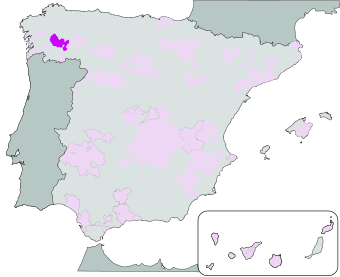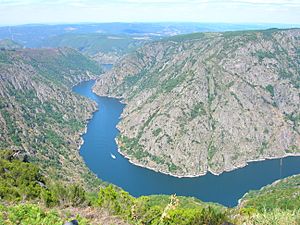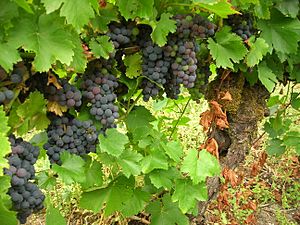Ribeira Sacra (DO) facts for kids
| Wine region | |

|
|
| Official name | C.R.D.O. Ribeira Sacra |
|---|---|
| Type | Denominación de Origen Protegida (DOP) |
| Year established | 1996 |
| Country | Spain |
| Size of planted vineyards | 1,241 hectares (3,067 acres) |
| No. of wineries | 90 |
| Wine produced | 35,787 hectolitres |
| Comments | Data for 2016 / 2017 |
Ribeira Sacra is a special area in Galicia, Spain, known for its wines. It has a special title called a Denominación de Origen Protegida (DOP), which means "Protected Designation of Origin." This title ensures that wines from this area meet certain quality standards.
The name Ribeira Sacra means "Sacred Shore." This area is found in the south of Lugo and the north of Ourense. The vineyards here are very unique. They are planted on the super steep slopes of the Miño and Sil river valleys. This makes growing grapes very challenging! The area officially became a DOP in 1996.
Wines from Ribeira Sacra are mainly made from three types of grapes:
- Red wine from the Mencía grape
- White wines from the Albariño grape
- White wines from the Godello grape
Contents
History of Ribeira Sacra Wines
The name Ribeira Sacra has an interesting past. It was first called Roboira Sacrata, which meant "Sacred Oak Grove." But in the 17th century, a monk made a mistake when translating it, and it became Ribeira Sacra, or "Sacred Riverside."
People believe that the ancient Romans were the first to plant grapes and make wine here. It's even said that a famous spiced wine called Vinos de Amandi was sent to Rome. This wine was served to the Roman emperor!
Monasteries and Vineyards
The name Ribeira Sacra is also linked to many old monasteries and hermitages. These were built between the 8th and 12th centuries in the hard-to-reach river valleys. There were 18 of these religious places. The monks living there were very important for wine-making. They replanted the vineyards for their own use and kept the tradition of growing grapes alive for many centuries.
Some of the important monasteries in the area include:
- San Pedro de Bembibre
- Taboada dos Freires
- San Paio de Diomondi
- Santo Estevo de Ribas de Miño
- Santa María de Pesqueiras
- Montederramo
- San Pedro de Rocas
- Ferreira de Pantón
- San Paio de Abeleda
- Santa Cristina de Ribas de Sil
- San Estevo de Ribas de Sil
Geography of the Wine Region
The Ribeira Sacra area is split into five smaller zones. Each zone has its own slightly different weather, called a micro-climate. However, the soil in all these areas is generally made of river deposits over a base of slate rock.
The five main sub-zones are:
- Chantada
- Amandi
- Ribeiras do Miño
- Ribeiras do Sil
- Quiroga-Bibei
Climate and Weather
The weather in Ribeira Sacra is more like what you'd find inland than near the ocean. It has long, hot summers and cool autumns. Even so, it gets a lot of rain, about 800 millimeters each year.
The areas along the Miño river get more rain (around 900 mm) than the areas along the Sil river (around 700 mm). This means the Miño area feels more like the coast, while the Sil area feels more like inland. Strong winds can also blow through the valleys because of their shape.
Grapes Grown in Ribeira Sacra
Many different types of grapes are grown here. The main red grapes that are recommended are:
- Mencía
- Brancellao
- Merenzao
- Sousón
- Caiño Tinto
- Tempranillo
Other red grapes that are allowed include:
- Garnacha tintorera
- Mouratón
The main white grapes that are recommended are:
- Godello
- Loureira
- Treixadura
- Dona Branca
- Albariño
- Torrontés
Terrace Vineyards
The vineyards are planted on special flat steps called bancadas (terraces) along the narrow river valleys. These terraces help the grapes get a very strong flavor. Because the terraces are often very small, machines cannot be used for tasks like pruning or harvesting. Sometimes, the only way to reach the vineyards is by boat from the river!
See also
 In Spanish: Ribeira Sacra (vino) para niños
In Spanish: Ribeira Sacra (vino) para niños
- Galician wine
- Spanish wine
 | Delilah Pierce |
 | Gordon Parks |
 | Augusta Savage |
 | Charles Ethan Porter |



